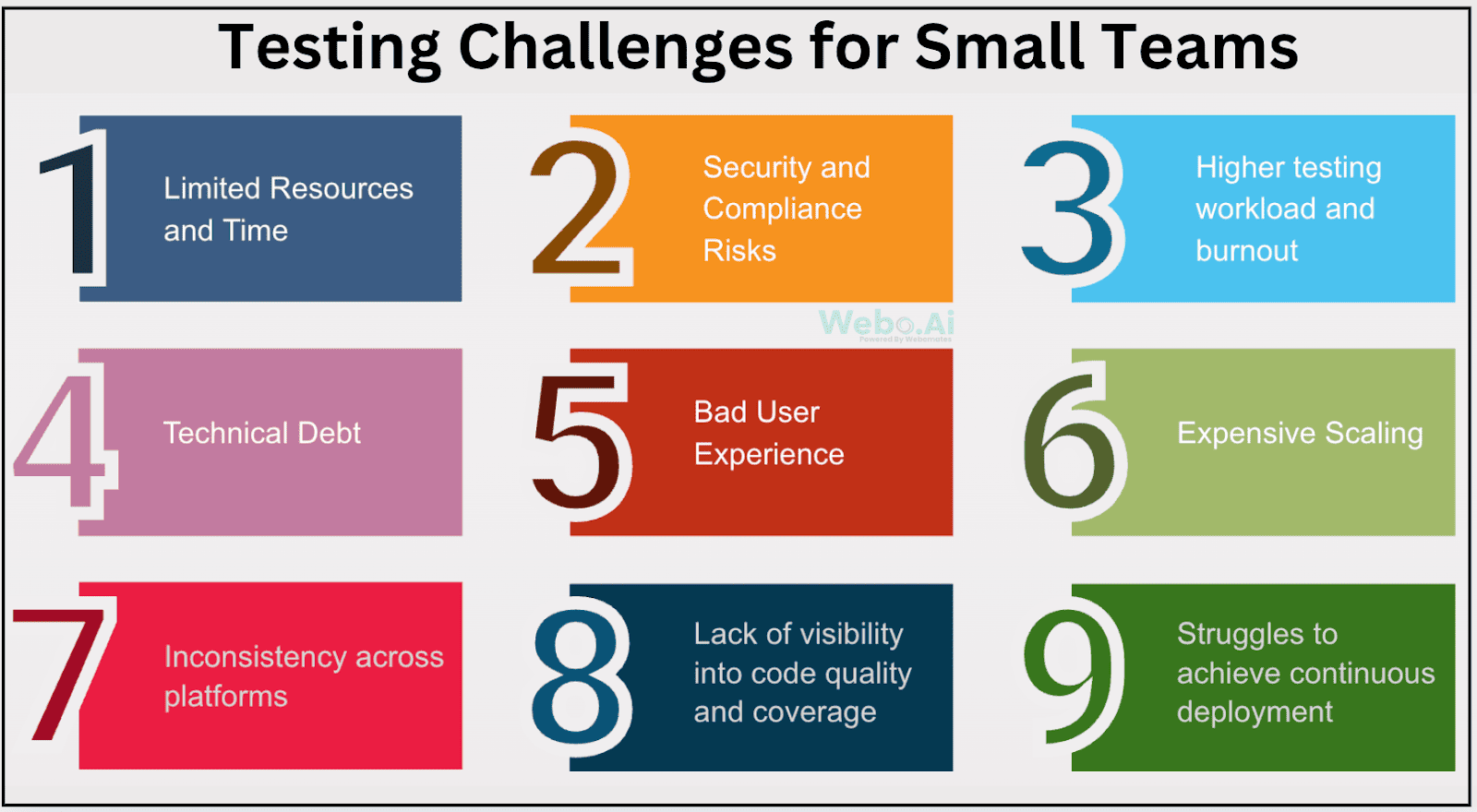How AI Test Automation Solves Challenges for Small Teams

Published on February 24, 2024
Introduction
Meet Alex, a startup founder with big dreams and a lean team. His product is gaining traction, but so are customer complaints about bugs, performance glitches, and security gaps. With every missed deadline, his frustration grows- so does the cost of fixing post-release issues. Scaling development without ballooning expenses feels impossible. What Alex needs is a way to improve software quality without draining his team’s energy or his startup’s budget.
This is where AI test automation changes the game.
The Challenges Alex’s Team Faces

1. Limited Resources and Time
Startups don’t have the luxury of large QA teams or infinite hours to run manual tests. Testing becomes a bottleneck, delaying releases and frustrating developers.
AI-Powered Solution: AI-driven automation slashes testing time by running thousands of test cases in minutes, freeing up developers to focus on building new features instead of debugging old ones. AI-powered tools use machine learning to prioritize high-risk areas and suggest optimal test scenarios, making testing more strategic rather than just extensive.
2. Security and Compliance Risks
Regulatory requirements are daunting, and a security loophole can lead to disastrous consequences, from data breaches to legal troubles. Security testing is time-consuming, and manually keeping up with compliance changes is impractical.
AI-Powered Solution: AI ensures continuous security testing, identifying vulnerabilities before hackers do. Automated compliance checks keep products aligned with industry regulations without the extra workload. AI-driven security testing tools proactively scan for threats, perform penetration testing, and ensure encryption protocols are intact, reducing risk exposure significantly.
3. Higher Testing Workload and Burnout
Small teams wear multiple hats. When testing demands skyrocket, burnout isn’t far behind. Manual testing consumes a large chunk of development cycles, and as software grows, so does the testing burden.
AI-Powered Solution: Automated testing lightens the load by handling repetitive test cases, running parallel tests across different environments, and catching issues before they escalate. AI-powered testing frameworks enable self-healing scripts that adapt to UI changes, reducing the need for constant maintenance.
4. Technical Debt
Cutting corners on testing creates long-term problems- quick fixes today lead to massive overhauls tomorrow. Unchecked technical debt makes it harder to maintain software stability over time.
AI-Powered Solution: AI maintains test scripts, adapts to code changes, and prevents technical debt from piling up by automating regression testing. AI-based predictive analytics can highlight sections of the codebase that are more prone to errors, enabling proactive refactoring rather than reactive firefighting.
5. Bad User Experience Leading to Loss of Customers
A buggy app is a surefire way to lose customers. If users experience crashes, slow load times, or broken features, they won’t stick around. Inconsistent UI/UX can lead to frustration and negative reviews.
AI-Powered Solution: AI predicts potential failures by analyzing patterns and ensuring that every update enhances user experience instead of breaking functionality. AI tools can perform usability testing by simulating real-user interactions, ensuring a seamless and intuitive experience.
6. Expensive Scaling
Hiring more testers isn’t always feasible when growing a product. Expanding teams without proper automation leads to increased overhead and inefficiency.
AI-Powered Solution: AI enables efficient scaling by automating test creation, execution, and maintenance- reducing the need for additional manual testers while keeping quality high. AI-powered test case generation tools dynamically create and execute test scenarios based on user behavior, reducing redundancy and improving coverage.
7. Difficulty Maintaining Consistency Across Platforms
A seamless experience across web, mobile, and desktop is non-negotiable. But ensuring that consistency is a nightmare without automated cross-platform testing.
AI-Powered Solution: AI-powered testing tools execute test cases across multiple platforms simultaneously, ensuring a consistent experience no matter the device. AI tools also facilitate visual testing, detecting even minor UI discrepancies that might be missed in manual reviews.
8. Lack of Visibility Into Code Quality and Test Coverage
How do you know if your test suite is actually doing its job? Tracking test effectiveness and code quality is challenging without real-time insights.
AI provides real-time analytics, heatmaps, and dashboards that show test coverage, bug patterns, and code quality insights, keeping the team informed and proactive. AI-driven code analysis tools flag potential defects before they cause major issues, improving software stability.
9. Struggles to Achieve Continuous Deployment
Frequent releases should mean higher efficiency, not more stress. Without automation, continuous deployment feels like a distant dream.
AI integrates seamlessly with CI/CD pipelines, ensuring every new build is tested, validated, and ready for deployment in record time. AI can also automate rollback procedures in case of failed deployments, minimizing downtime and maintaining stability.
Why Startups Need AI-Powered Automation Tools Like Webo.ai?
AI in software testing isn’t just a nice-to-have- it’s a necessity for scaling development teams while keeping costs down.
- How AI Can Reduce Software Testing Costs: AI eliminates redundant testing efforts, reduces manual intervention, and prevents costly post-release fixes.
- How to Automate Testing with AI for Cost Savings: AI-powered test automation tools run extensive test suites in minutes, cutting both labor costs and release cycles.
- How Can AI Help Scale Development Teams Without Increasing Costs By automating tedious testing tasks, AI enables small teams to operate like larger ones without the added payroll.
- What Are the Benefits of AI in Software Testing for Cost Reduction Faster releases, fewer bugs, better user experience, and lower operational expenses.
- What AI Tools Are Best for Cost-Effective Software Testing Tools like Webo.ai offer intelligent test automation, real-time analytics, and seamless CI/CD integration—tailored for startups looking to scale efficiently.
Alex found his answer in AI-driven test automation. It transformed his team’s workflow, reduced costs, and accelerated growth. If your startup is struggling with testing bottlenecks, inefficiencies, and quality issues, it’s time to explore AI-powered automation.
